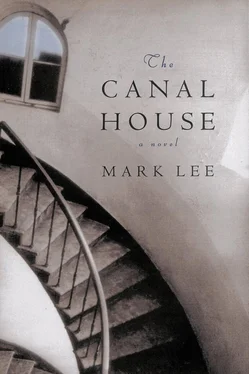Some leaves rustled and the nun reappeared with a white saucer. She placed it on the bench, smiled again, and left us alone. Daniel already had a saucer filled with ash. The nuns probably believed that all American males spent their recreational time smoking cigarettes and staring at tropical plants.
“You all right?” I asked.
“Not really.”
“Want to tell me what happened?”
“I don’t know if it would make any sense, Nicky. I’m a little confused right now.”
I didn’t say anything and we both sat quietly on the bench. There’s one good thing about working in the so-called Third World—it teaches you how to wait. I had once spent several weeks in Kinshasa, waiting to take a ferry up the Congo River. First the boat’s engine exploded and then our captain was arrested for stealing a truckload of flashlight batteries. Every two or three days there was a new disaster, but the third-class passengers held on to their little patches of the deck. We weren’t going to leave Kinshasa, I thought. Not today or even next year. Then, one bright morning, we cast off lines and headed up the river.
It was getting dark in the convent garden. Pots rattled in the kitchen as the nuns prepared supper. I wondered if we were going to sit there forever and decided that the convent wasn’t a bad place to spend eternity. All I needed was a cushion for the bench, some decent caviar on Melba toast with grated onion and a squeeze of lemon. Maybe a bottle of chilled white wine.
“All of us have different assumptions about the world,” Daniel said. “They might be real or they might be illusions, but it doesn’t really matter. We believe in these stories, these little fantasies. They help us deal with our jobs and our personal desires. But sometimes, you’re caught up in a storm and then you see everything in a new way. What are you supposed to do, Nicky? How do you get normal again?”
“Don’t worry about that. Just talk to me.”
When Daniel climbedinto the Cessna with Joan Siebert, he assumed that they were going to fly south to Entebbe. Paul Rosen had a different plan. He still wanted to prove that Sudanese soldiers were crossing the border and killing animals in Kidepo park.
“I’m going to fly over the park one more time,” he said. “It won’t take long.”
“And what if we don’t see anything?” asked Daniel.
“Then I’ve got to coax another reporter to come up here.”
Daniel thought that Joan would be upset about the detour, but it didn’t appear to bother her. As they flew west over the park, Tobias kept pointing out different species of vultures and hawks that were riding the thermals. Joan borrowed some paper from Daniel so she could write down their names.
“I still love Africa,” she told Daniel. “It’s important that you put that in your article. There’s nothing wrong with looking at chickadees and robins back home, but they can’t compare to a black-winged vulture.”
A week earlier three adult elephants and a calf had wandered out of the park. They were still protected by Ugandan law, but Paul was worried about them. He passed low over a patch of thorn trees and found the water hole that the elephants had been using. Within a few minutes, they saw the calf alone, running across the savanna. The calf’s trunk was extended and he looked confused.
“There!” Paul pointed west to some black specks floating in the air. They flew closer and the specks became vultures circling over a kill. Paul went lower and Daniel saw five men wearing tan uniforms standing next to an army truck. They were butchering three adult elephants with axes and knives. The area around the carcasses was dark where blood had been absorbed into the ground.
“Do you see that?” Paul shouted. “You’re a witness!” He banked the plane hard and turned it around while Tobias fumbled in his backpack for a camera. As they passed over the soldiers a second time, several men ran to the truck to get their weapons.
They took another hard turn in the sky. Now Tobias was ready with the camera. The Sudanese began firing as they approached, but Daniel assumed that the plane was flying too high to be damaged. There was a sudden booming sound and the entire plane began to shake and rattle like a freight car that had gone off the tracks.
“Something hit the propeller!” Paul shouted. “I’m cutting power!”
He turned off the engine. The shaking stopped, but the plane began to glide downward. It was very quiet. Only a few seconds had passed, but time seemed to stretch like a bowstring pulled by an archer. Paul switched off the fuel, the magnetos, the lights, and the radio. “Prop the doors open,” he told them.
Tobias opened the door on his side, removed his shoe, and forced it into the crack. Daniel opened the other door and wedged a sweatshirt against the hinge. He glanced back out the window and saw that they had dropped lower. Paul aimed the Cessna toward a flat patch of ground near a dry river.
“Seat belts on. Brace for a landing.”
Daniel glanced over at Joan Siebert. Her initial panic and surprise had disappeared. She seemed to realize that they were going to die. Daniel remembered how much she had wanted to see her grandchildren again, but she nodded slightly as if to tell him, Yes, we’ll be all right. He looked out the window one last time and saw that boulders were scattered across the landing site.
“It’s no good,” Paul said. Daniel didn’t know if he was talking to himself or Tobias. “No …”
They landed hard, the plane skittering across the ground. The left wing hit a boulder and was ripped away. There was a grinding sound and the Cessna flipped tail first up into the air.
DANIEL SNUBBED OUT his cigarette and stopped talking. We sat there for about ten minutes watching a bird flutter around the garden. Church bells rang in the distance and another set of bells answered.
“At the last moment, right before we crashed, I reached out and took Joan’s hand. When the plane flipped over I could feel her fingers being pulled away from me. And then something happened, Nicky. Something I still don’t understand. I’ve spent most of my life writing about various incidents, summing it all up in a few words. But it’s difficult to describe this experience. It was—it was overwhelming.”
Daniel shook his head and looked away. “When I was a little boy my mother and I went out shopping and it started to snow. We were waiting for something, a bus or a taxi, and it was getting cold, so my mother drew me into her long wool overcoat and sheltered me there. It was warm and safe inside the fabric, but I could look out at the snow drifting down onto the parked cars and the sidewalk. That’s sort of how it felt after the crash, but it was much more powerful. I was held and protected but still part of the world.”
WHEN DANIEL WOKE UP, his left arm was in a splint and his chest hurt. He heard a creaking sound, voices, then he opened his eyes.
A soft whiteness surrounded him. It took him a few seconds to realize that he was naked and lying beneath a sheet on a narrow bed, protected by a mosquito net. He moved his legs slightly. The net was pulled away and a thin Ugandan woman looked down at him. Daniel saw that he was in a small room with white walls. Sunlight glowed through a narrow window. Daniel wanted the woman to say something, tell him that he was all right, but she left him alone. He closed his eyes for a while, and when he opened them again the woman had returned with a Ugandan priest.
The priest was a short man in his sixties. He wore old-fashioned horn-rimmed glasses, very large, that magnified his dark brown eyes. The priest stared at Daniel, not as a challenge, but as a means of communication.
Читать дальше












